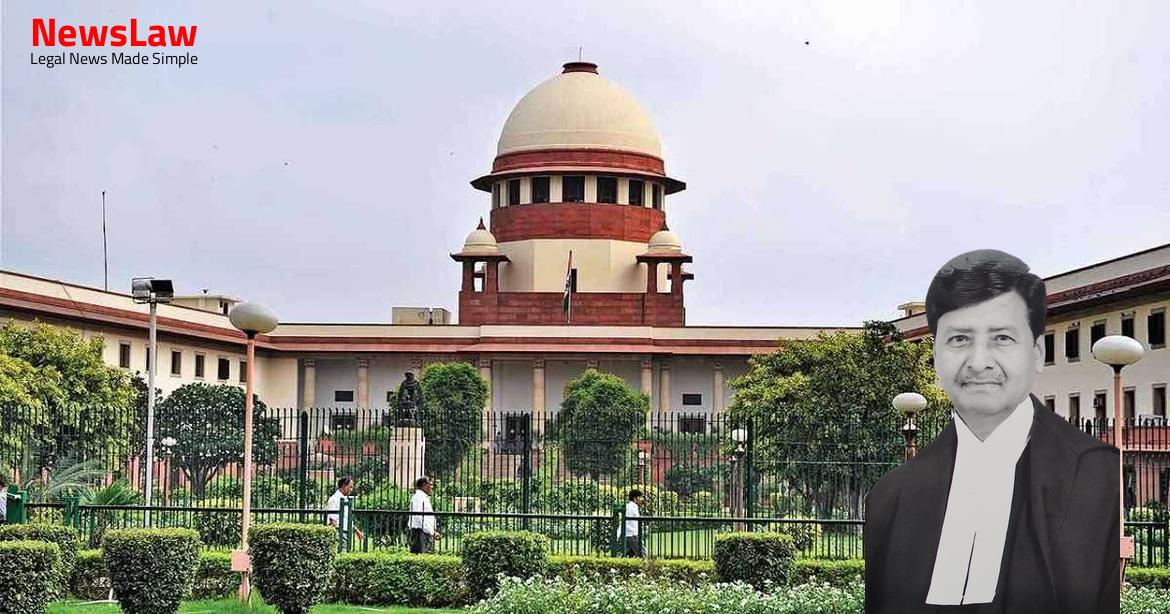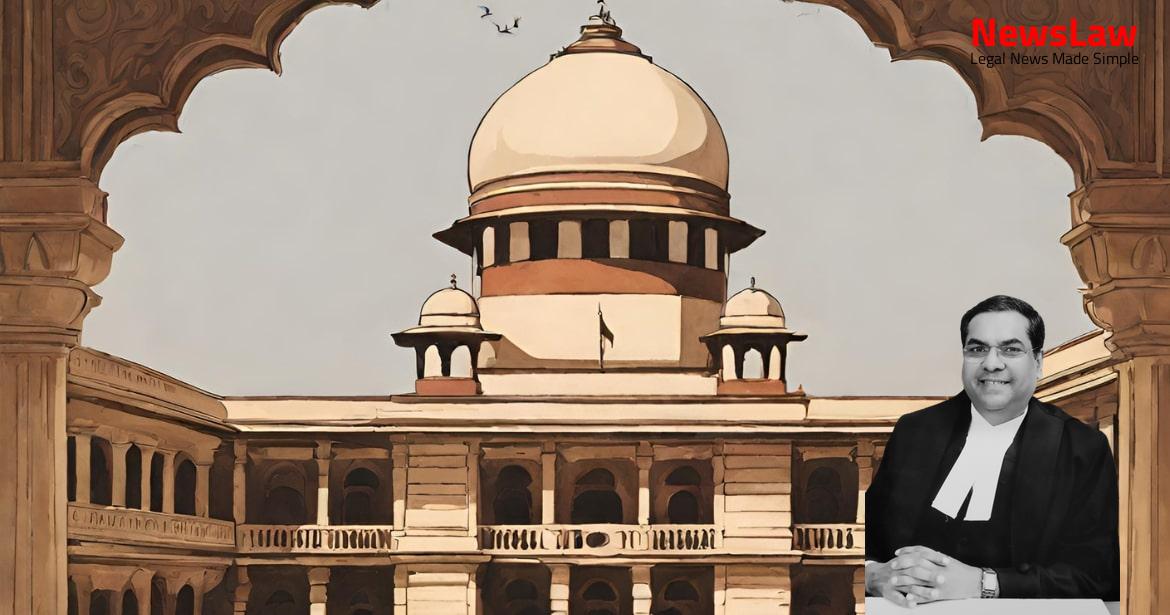In a groundbreaking decision, the Supreme Court of India has delivered a significant judgement concerning Rule 6(4)(m)(i) of the KST Rules. The case in question involves a dispute regarding the interpretation of tax provisions and exemptions. This ruling is set to have far-reaching implications in the realm of taxation law, setting a precedent for future cases. Stay informed as we delve into the details of this crucial legal development.
Facts
- The civil appeal is regarding the validity of Rule 6(4)(m)(i) of the KST Rules read with Explanation III to Rule 6(4) of the said rules.
- The question raised is whether the condition of ‘use in the same form in which such goods are purchased’ under Rule 6(4)(m)(i) expands the scope of charging section i.e. Section 5B under KST Act, 1957.
- The appellant, a private limited company engaged in interior decoration and other work, purchased timber in log forms, plaster of paris, plywood, and glass sheets for interior decoration purposes.
- The purchased items were manufactured to produce goods necessary for interior decoration.
- Explanation III of the Rule clarifies that ‘in the same form’ does not include purchases that are consumed or used in the manufacturing of other goods in the works contract.
- Hence, the claimed deductions for such purchases are not allowed.
- The appeal filed by the Government of Andhra Pradesh against the Order in SLP(C) Nos. 6804-6849 of 1998 was dismissed by the Supreme Court on 29 October, 1998.
- The judgement of the High Court of Andhra Pradesh regarding Rule 6(4)(m)(i) was considered in the decision.
Also Read: Judgment: Dispute Resolution in Infrastructure Contracts
Arguments
- Rule 6(4)(m)(i) does not go against the charging provision and is in conformity with Section 5B of the KST Act.
- Explanation III in Rule 6(4) clarifies that goods can only be taxed once and not subjected to multiple taxes.
- Provisional assessment under Section 28 cannot be initiated if there is no pending assessment under Section 12A.
- The notice for provisional assessment was issued without a valid reason as assessments under Section 12 had been finalized.
- The High Court of Andhra Pradesh striking down a similar provision is not applicable in this case.
- The transformation of taxed goods into a different commodity for works contract is subject to taxation within legislative competence.
- Invoking Section 28(6) of the Act was not justified as there was no pending assessment to be revised.
- Judgment in Media Communications Vs. Government of Andhra Pradesh is considered irrelevant and misplaced in this context.
- The observations made in the Media Communications case do not amount to a decision in affirmation only because the special leave petitions filed by the State of Andhra Pradesh were dismissed.
- The eligibility of the assessee under Rule 6(4)(m)(i) is a question of fact that needs to be determined in the ongoing proceedings due to the impugned notices served on the appellant.
- The provisional assessment is still pending as the current proceedings have not been concluded, giving the Department the opportunity to complete the proceedings lawfully.
Also Read: Supreme Court Judgment: SAIL vs. Ispat Khadan Janta Mazdoor Union
Analysis
- The appellant claimed exemption for iron and steel goods used in the fabrication of doors, window frames, grills, etc. for works contracts.
- Section 5B of the KST Act is a charging provision for the levy of sales tax.
- Rule 6(4)(m)(i) provides for deduction from tax for goods used in works contracts that have already suffered tax and are used in the same form.
- Explanation III to Rule 6(4) clarifies that goods after being purchased and used in the execution of a works contract cannot be subject to multiple incidences of tax.
- Five notices were issued for different assessment years under Section 28(6)(iii) of the KST Act, 1957.
- The appellant challenged the constitutional validity of Rule 6(4)(m)(i) read with Explanation III to Rule 6(4) in a writ petition.
- The writ petition was dismissed by the Single Judge and the LPA was also dismissed.
- Section 5B of the KST Act and Rule 6(4)(m)(i) of the KST Rules operate in different spheres, as clarified in Explanation III to Rule 6(4).
- The High Court’s judgment in the case of State of Karnataka v. Anant Engg. Words is correct as iron and steel goods used in the manufacture of other goods are not exempt from tax.
- The principle from Pyare Lal Malhotra and Others case is considered and reiterated in Vasantham Foundry Vs. Union of India case.
- Sales tax law is intended to tax sales of different commercial commodities and not the production or manufacture of specific substances.
- Sales tax can only be levied on the same goods once as long as they retain their identity of a particular type.
- The judgment in Telangana Steel Industries case supports the reasoning of the High Court in Media Communications case.
- Rule 6(4)(m)(i) allows deductions for goods that have already been taxed and retain their original identity when used in works contracts.
- Tax provisions granting exemptions/concessions must be strictly construed as per the judgment in M/s. Achal Industries Vs. State of Karnataka.
- There is no difference between Rule 6(4)(m)(i) read with Explanation III and Section 5B of the KST Act, 1957 as contended by the appellant.
- The rejection of special leave petitions by the Supreme Court does not constitute approval of the High Court’s view in Media Communications case.
- If separate commercial commodities emerge from goods already taxed, the new commodity is liable to sales tax as per the judgment in State of Tamil Nadu vs. Pyare Lal Malhotra and Others.
- Shri Tarkunde’s emphasis is that the goods in question cannot be seen as two different commercial commodities.
- The assessee’s eligibility under Rule 6(4)(m) (i) is a factual question to be determined in the assessment proceedings.
- The provisional assessment has not been finalized due to the ongoing proceedings.
- The appeal is dismissed as it lacks substance.
- If the two goods are considered different commodities, the single point taxing principle would not prevent the realization of tax from the sale of wires.
Also Read: Dismissal Upheld in Disciplinary Proceedings of CISF Constable
Decision
- Pending application(s) are disposed of with no costs.
- The assessing authority can proceed with the impugned assessment proceedings initiated in 2002 independently.
- The assessing authority should not be influenced or inhibited by the court’s observations.
- The assessing authority must afford an opportunity of hearing to the appellant before concluding the proceedings expeditiously and in accordance with law.
Case Title: M/S CRAFT INTERIORS (P) LTD. Vs. THE JOINT COMMISSIONER OF COMMERCIAL TAXES(INTELLIGENCE), BANGALORE
Case Number: C.A. No.-008898-008898 / 2011



